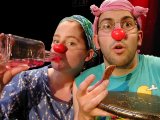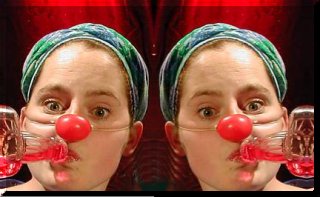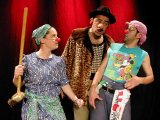The pedagogical theories at the Lecoq school originate in the
experience of its founder and master teacher, Jacques Lecoq, in teaching
gymnastics and performing in commedia dell'arte. A very diverse programme
is therefore taught, from acrobatics to analysis of everyday movement
through to improvisation.
The year begins with the study of le masque neutre, the neutral mask,
which is the basis of all performance at the school. Essentially, the
Lecoq student learns how to do 'nothing' on stage. Next, the traits
of the masque neutre are instilled in the students, including le désir,
l'espace et le regard. In this state one is alert, aware of space and
aware of one's presence in that space. This is one of the most difficult
learning processes for the Lecoq student, and from this point the work
expands into various fields. In improvisation classes we work with different
elements, materials, substances, colours, objects, music and poetry.
This effectively culminates in the individual creation of characters/personages
and on to mask-making and performance.
Each week the students devise a small piece of theatre on a given
theme. This class is called Autocours, where the students work in small
groups and are critiqued by Monsieur Lecoq and the other teachers. Finally,
the first year ends with L'Enquête, or the Inquiry. In groups
of 10, the students choose a generic theme, e.g. fast food. They then
spend two weeks 'inquiring' or researching this theme, e.g. watching
people work in McDonalds. The second two weeks are spent devising the
piece together, and finally, there is a performance in front of an invited
audience.
The point which is constantly referred to chez Lecoq is: Less is More.
This has also become my motto. When devising theatre or indeed in giving
workshops on devising, I keep the Less is More principle in mind as
follows:
It is important to always be in control as the facilitator
in the creative sense. Know exactly what you want from each session
before you go into the group at all, and to try to gear the session
in that direction. Sometimes I have a theme for each session, and try
to stick to it alone without infringing on the creativity of the performers
themselves.
 |
For example, during a director's
project at Trinity College Dublin, I devised a piece, Siobhán,
based on the life of actress Siobhán McKenna. In one session
I specifically wanted to essentialise in just one piece her childhood/relationship
with her family. The group and I spent three hours working together,
using just the word 'family' and one piece of music as a stimulus.
The result was the best scene in the show. Thus, one piece of
music and one word - simplify!
|
|
As facilitators don't be afraid to stretch games/exercises,
especially if you know your group well and you can trust each other.
Method or Stanislavski approaches aren't always necessary - again, keep
it simple. In Siobhán, the ensemble used a 'flocking' exercise
to help them improvise images/physical ideas. Flocking is a glorified
and effective version of follow-the-leader where one person leads a
movement and the others copy. To begin, it's good to have one person
at the front leading the others in the formation of a flock of birds.
As the group gets comfortable, the leader movement can be taken over
at any time by another performer and the group can move around the entire
space.
When stuck - brainstorm! Get your group to help you. Working
with the outreach/community arts groups in the Macnas Carnival of Fools
parade, I tried to give them a feel for the parade's theme. So I asked
them: what does medieval mean to you? What do you think of when I say
Notre-Dame? From this I made big lists of their responses, which gave
them and me plenty of ideas. To bring this notion onto a more practical
level I asked them to choose three different words from the list and
then in small groups to physicalise these words in three different frozen
images - postcards. This game was then extended by saying action to
each group in their frozen image and then freeze again.
Stimuli such as images, photos, drawings, colours, stories,
poems and music I find very helpful when devising.
Finally, when devising don't be too precious. You are not obliged
to use absolutely everything created in the sessions. And as I create
and teach more, I'm learning more too - how to listen to performers,
how to provoke and to let myself be provoked. I'm now adapting to situations
that arise, learning to read the group and to go with their mood at
a given time. It's important to challenge oneself, to keep it simple
and to enjoy it all - otherwise it's not worth it and you're in the
wrong business!
|

